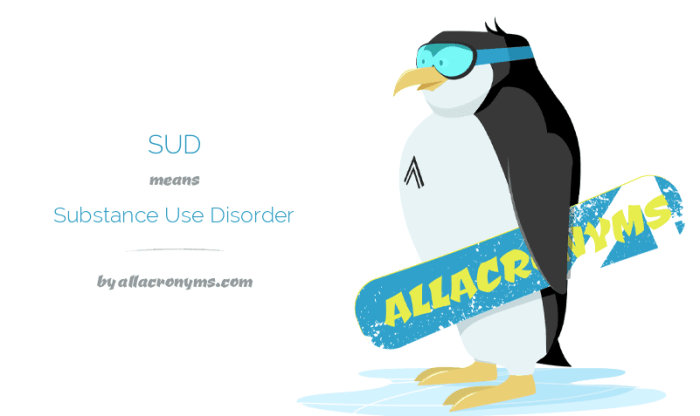SUD abbreviation – At the heart of effective communication lies the skillful use of abbreviations, and SUD stands out as one such widely employed acronym. Embarking on a journey to decipher the meaning and usage of SUD, we delve into its origins, explore its various types, and unravel its proper application in diverse contexts.
SUD, an abbreviation that has permeated various fields, holds a wealth of meanings and applications. From medical settings to educational institutions, this versatile acronym serves as a concise way to convey specific concepts.
SUD Abbreviation Overview
SUD is an abbreviation that stands for Substance Use Disorder. It is a term used to describe a pattern of problematic use of alcohol or other drugs that leads to significant impairment or distress. SUDs can range from mild to severe, and they can have a significant impact on an individual’s physical, mental, and social well-being.
The term SUD was first introduced in the Diagnostic and Statistical Manual of Mental Disorders (DSM-5) in 2013. It replaced the previous term “substance abuse” or “drug addiction”. The change in terminology was made to reflect the fact that SUDs are a complex disorder with a range of symptoms and severity levels.
SUD Abbreviation Types
There are several different types of SUDs, each with its own unique symptoms and characteristics. The most common types of SUDs include:
- Alcohol Use Disorder (AUD): AUD is a pattern of problematic alcohol use that leads to significant impairment or distress. Symptoms of AUD can include difficulty controlling alcohol intake, drinking in hazardous situations, and experiencing withdrawal symptoms when alcohol use is stopped.
- Opioid Use Disorder (OUD): OUD is a pattern of problematic opioid use that leads to significant impairment or distress. Symptoms of OUD can include cravings for opioids, difficulty controlling opioid use, and experiencing withdrawal symptoms when opioid use is stopped.
- Cannabis Use Disorder (CUD): CUD is a pattern of problematic cannabis use that leads to significant impairment or distress. Symptoms of CUD can include difficulty controlling cannabis use, using cannabis in hazardous situations, and experiencing withdrawal symptoms when cannabis use is stopped.
- Stimulant Use Disorder (SUD): SUD is a pattern of problematic stimulant use that leads to significant impairment or distress. Symptoms of SUD can include increased energy, decreased need for sleep, and increased risk-taking behavior.
- Hallucinogen Use Disorder (HUD): HUD is a pattern of problematic hallucinogen use that leads to significant impairment or distress. Symptoms of HUD can include hallucinations, delusions, and impaired judgment.
SUD Abbreviation Usage

SUD abbreviations are commonly used in a variety of settings, including:
- Healthcare settings: SUD abbreviations are often used in healthcare settings to describe a patient’s substance use history and diagnosis. For example, a patient with AUD may be diagnosed with “Alcohol Use Disorder, moderate severity”.
- Research settings: SUD abbreviations are also used in research settings to describe the study population and findings. For example, a study on the effectiveness of a new treatment for AUD may include participants with “Alcohol Use Disorder, severe severity”.
- Public health settings: SUD abbreviations are also used in public health settings to describe the prevalence and impact of substance use disorders. For example, a report on the prevalence of SUDs in the United States may include data on the number of people with “Alcohol Use Disorder, any severity”.
SUD Abbreviation Alternatives

In some cases, it may be more appropriate to use an alternative term to SUD. For example, the term “substance misuse” may be more appropriate in settings where the individual is not yet experiencing significant impairment or distress from their substance use.
The term “substance dependence” may be more appropriate in settings where the individual is experiencing severe impairment or distress from their substance use.
The following table provides a list of SUD abbreviations and their alternatives:
| SUD Abbreviation | Alternative Term |
|---|---|
| SUD | Substance Use Disorder |
| AUD | Alcohol Use Disorder |
| OUD | Opioid Use Disorder |
| CUD | Cannabis Use Disorder |
| SUD | Stimulant Use Disorder |
| HUD | Hallucinogen Use Disorder |
Conclusion: SUD Abbreviation

In conclusion, the SUD abbreviation has established itself as an indispensable tool in streamlining communication across diverse domains. Its multifaceted nature demands a nuanced understanding of its various forms and usage guidelines. By embracing the insights presented in this exploration, individuals can effectively harness the power of SUD abbreviations, enhancing clarity and efficiency in their written and spoken exchanges.
Questions Often Asked
What is the origin of the SUD abbreviation?
The origins of the SUD abbreviation vary depending on the context in which it is used. In medical settings, it is commonly associated with the term “substance use disorder,” while in educational contexts, it may refer to “student union dues.”
How do I use SUD abbreviations correctly?
The proper usage of SUD abbreviations requires attention to the context and intended audience. In formal settings, it is advisable to spell out the full term upon first use and then use the abbreviation subsequently. In informal contexts, abbreviations can be used more freely, but clarity should always be prioritized.